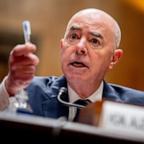New Cancer Patients Struggle to Land Appointments With Oncologists
Kate-Madonna Hindes called nine cancer centers looking for an oncologist.
June 6, 2011— -- For Kate-Madonna Hindes, the only thing more terrifying than having to see an oncologist was the nightmare of landing an appointment. In the two weeks after a routine pap smear showed signs of cervical cancer, Hindes, who is 29 and has already survived cervical cancer once, called nine different cancer centers and specialists. And most of the time, she couldn't even get a live person on the phone.
"I've just heard I might have cancer again, and now it's in my hands to get hold of somebody," Hindes said, explaining the frustration of leaving messages, then waiting for a reply. "It's extremely stressful."
Eventually, two of the nine centers agreed to bring Hindes in for an initial visit -- a dismal 22 percent success rate. And her struggle is typical. According to a study presented Saturday at a meeting of the American Society of Clinical Oncology in Chicago, only 22 percent of newly diagnosed cancer patients with private insurance land a first appointment with an oncologist. That number dropped to 17 percent for patients on Medicaid.
"As providers, we don't have a good sense of how many patients aren't making it through the door," said Dr. Keerthi Gogineni, an instructor in the division of hematology-oncology at Penn's Abramson Cancer Center ,and lead author of the study. "There's a whole group of people having trouble getting that initial appointment," which can be stressful, "especially when they're facing a new diagnosis and feeling overwhelmed."
Gogineni used research assistants posing as patients to uncover the challenges people face in getting appointments with oncologists. The undercover callers contacted 160 U.S. hospitals and explained their scripted diagnoses, varying only their insurance status. And although they reached a scheduler 79 percent of the time, only 29 percent of those calls led to appointments.
The most common reason for an appointment to be denied was insufficient medical records.
"Not everyone is going be able to gather all the resources they need to get in," Gogineni said, describing the mountain of paperwork, including doctor' notes, pathology reports and scans an oncologist needs to create a treatment plan. "But we have to meet patients halfway. In terms of getting a foot in the door, I think there's got to be a compromise."
Callers who said they were uninsured landed appointments 29 percent of the time -- a finding that might reflect the added administrative burden of working with insurance providers, Gogineni said.
The callers gave centers three tries, and about a quarter of the time they were put through only to voice mail.
"It was very hard to get in touch with someone who could actually help you. And once you did, chances were you still weren't going to get an appointment," Gogineni said.
Of the appointments ultimately scheduled, 35 percent required multiple calls to get the appointment. And for Hindes, a director of marketing in Minneapolis and a single mother to 5-year-old Ava-Madonna, the ordeal was exhausting.
"I almost hear myself saying, 'I just don't have time for cancer. I don't have time to deal with this,'" she said.
With a foot finally in the door, Hindes is on to the next obstacle: Getting coverage from a provider that considers her cancer a pre-existing condition. And after losing three friends to recurrent cervical cancer this year, Hindes said she's desperate to start treatment.
"The time you spend waiting to find out what grade it is, that's probably the worst," she said. "Your mind is just going and going."




